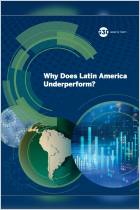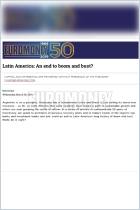Зарегистрируйтесь на getAbstract, чтобы получить доступ к этому краткому изложению.

Зарегистрируйтесь на getAbstract, чтобы получить доступ к этому краткому изложению.
Ernesto Talvi
Latin America Macroeconomic Outlook: A Global Perspective
Macroeconomic Vulnerabilities in an Uncertain World: One Region, Three Latin Americas
Brookings Institution, 2014
Что внутри?
The economic prospects for Latin American countries are anything but uniform.
Recommendation
From 2004 to 2011, Latin America experienced uniformly robust growth, save for one year during the Great Recession. The more recent past, however, has been less auspicious, with the region’s economic performance diverging into three tiers. Economist Ernesto Talvi highlights the “one region, three Latin Americas” phenomenon in this concise, user-friendly overview of the continent’s prospects. Though the report sometimes skimps on detail and can be repetitive, it succinctly lays out what Latin American countries must do to ensure their economic futures. getAbstract recommends this astute analysis to executives and investors with interests in the region.
Summary
About the Author
Ernesto Talvi is a nonresident senior fellow and the director of the Brookings Global-CERES Economic and Social Policy in Latin America Initiative.



















Comment on this summary